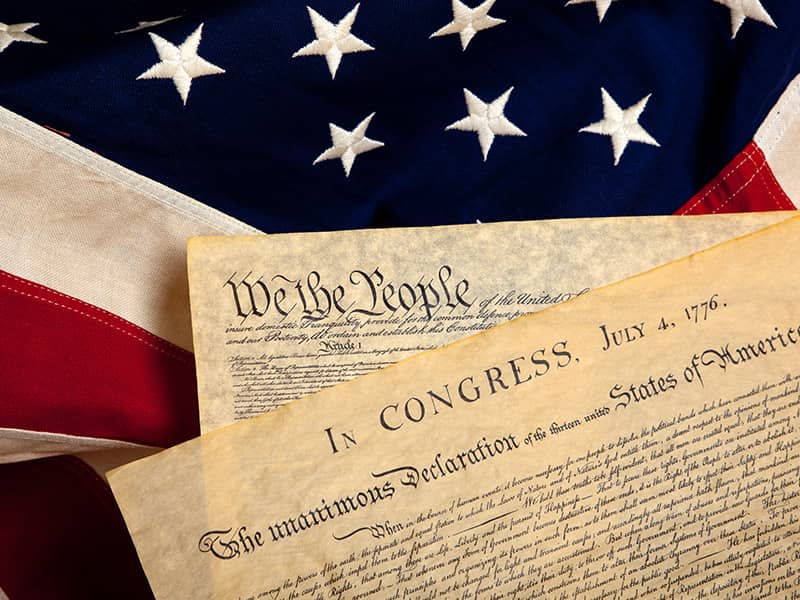In a nation where the number of non-Judeo-Christians is already formidable, steadily rising, but intractably invisible, the question ought to be: When will America be ready for a Wiccan, a reincarnated Buddhist, or--Vishnu forbid--an admitted atheist in the White House?
Judeo-Christian domination of political life in America is so well established, adherents rarely notice how dismissive they are of other religions. (And let's not even discuss atheism: The standard reply to any such self-identification is a goggle-eyed "How do you get up in the morning?") Jesse Jackson, in signaling African-Americans to support Lieberman, wrote:
 | ||
| Judeo-Christian domination of political life in America is so well established, adherents rarely notice how dismissive they are of other religions. | ||
 |
"As Americans, whether Catholic, Jewish, or Protestant, we live in our faith, and we live under the law...and Senator Lieberman has remained true to this standard. We must shift the discussion from religion to his role as a credible moral leader." Given the first sentence, "religion" here can only be code for "non-Christian-but-grudgingly-acceptable." More important, it is also a socially palatable way for Jews and Christians to divide the spoils of cultural domination--redefine a universal term narrowly. Exclusively. Somehow Jackson, the champion of the marginalized, managed to misplace an American or two. It is Judeo-Christian privilege, pure and simple, in defiance of the America religious landscape as it truly is.
Did you know that there are more agnostics and atheists than Unitarians (1,186,00 versus 502,000)? More Muslims than Jews (3,950,000 versus 3,137,00)? In fact, there are more "non-religious" people (13,116,000) than Jews, Unitarians, Buddhists, and Hindus combined. Thirteen million non-religious, and we're all either "Catholics, Jewish, or Protestant"? Judeo-Christian triumphalism may be the real story in the Lieberman controversy. Surveying the delegates to the convention makes the point.
Trying to locate convention delegates and official participants who are neither Jews nor Christians is a thankless task (DNC officials don't collect that data). In contrast with the Republican convention a few weeks ago, racial diversity is everywhere here. But where are the saris? The turbans? Dreadlocked Rastas? The foreheads of Muslim men deeply indented by prostrating themselves five times daily to Mecca? There are Samoans in ceremonial bare chests and skirts, but is that a religion? In polling random delegates for anyone in their delegation who is neither Jewish nor Christian, repeatedly one hears either stumped silence or a duh-inflected, "Well, Bob's a Catholic...wanna talk to him?" Why not diverse diversity here of all places?
But it just might be that non-Judeo-Christians in America are simply a pragmatic and patriotic lot who understand that dues must be paid. Eventually, I spotted and pursued a coterie of turbaned Sikhs; none were delegates, but all were long-time party activists. Dr. Balwant Singh, wearing an orange turban with matching short cape, has lived in Pascagoula, Miss., since 1978. He served three times in the Mississippi Electoral College and was a delegate to the 1992 and 1996 conventions. Now, he's on the Standing Committee, a national party panel. He claims to have never encountered religious discrimination. Ever. In Mississippi. In 1997, he lost the school-board election in Pascagoula to a Republican. "Not to a Christian?" I asked. He looked at me strangely. "No. A Republican." His religion, he says, never came up.
Inderjit Singh, executive chairman of the South Asian Community Council and assistant to the director of the New York City Housing Authority, agrees. He's running for the Queens City Council and also says that his religion has never been made an issue. "I don't see the system as in conflict with my beliefs," he says, "because my beliefs tell me to be a good citizen, a good husband, and to do my duty in life." His beard and turban (all Sikh men wear them) have sometimes become an issue, he says, but ascribes those issues to lack of knowledge, "which is easily rectified with an explanation."
An example was when the Transit Authority tried to force its Sikh employees to wear the hard hats required of all transit workers. "It was a delicate situation. We could easily have bumped heads with the city, gotten legal. But we went in and explained that quite a few Sikh engineers work in construction in India without a higher rate of injury on the job," he said. Of course, the Sikhs did agree to release the city of liability from any injuries that could have been prevented by a hard hat. "Accidents will happen," he acknowledges. And when they do, the Sikhs will take care of their own.
For all his pragmatism, Inderjit Singh is not about to take a back seat in public life. Neither Mr. Singh was very interested in my queries about Jews and Christians monopolizing public life and the political legitimacy that those religions confer on them here. They're not bitter, but neither are they passive. "I came here from India in 1957. Half the population was born after I got here." Says Inderjit Singh pointedly. "I have as much claim as anybody else."
Hallelujah.

